Indexing is a form of writing—probably the only form of writing in which the goal is to get the reader out of your creation as soon as possible. A criterion of the American Society for Indexing’s (ASI’s) annual indexing competition requires an index to bring together references to similar concepts that are scattered in the text or that are expressed in varying terminology.
Understanding and organizing the information and ideas in a text and creating a helpful index requires a human touch; a computer cannot write a useful index. Indexer Do Mi Stauber gives an example in her book Facing the Text. I’ve emphasized the words a computer would probably index.
The progress of jazz from the margins to the center serves as a powerful and resonant symbol for racial progress, as when Gillespie . . . accompanied a Southern peanut-farmer-turned-president singing “Salt Peanuts” at the White House in 1978.
While all these terms are correct, a main subject is unnamed; only a human being (probably one over 50) could recall the peanut-farmer-turned-president as Jimmy Carter. A computer is incapable of life experience and background knowledge, so places, inferred ideas, and other significant information not plainly stated would be omitted.
Who Should Write an Index?
While the author is the expert on their subject, they are generally too close to the subject and lack familiarity with what makes a good index and the indexing process in general. I’ve seen author-written indexes list dozens of page numbers for one entry with no context. (Professional indexers generally create subheadings once there are five to seven locators under a main entry.) How frustrated would you be when you got to the ninth or thirteenth or twentieth entry and still hadn’t found what you were looking for?
A professional indexer can also be objective, making the index more useful and valuable to readers. This isn’t to say that NO author can or should write the index for their own book, but when it’s not their specialty, the index will take longer and likely not be as useful as if they hired a professional.
That is probably why most indexing is done by freelancers hired by authors, publishers, or book packagers. Many texts benefit from a well-written index, including
- nonfiction books
- databases
- websites
- corporate materials
- legal documents
- catalogs and periodicals
- e-books
Getting Started
To get started, you need internet connectivity, a computer with good word-processing software, and dedicated indexing software. Why special indexing software? Consider just two ways to index without it.
- Indexing in Word requires many steps, is tedious, and doesn’t show a preview as the index builds. Word add-ons, such as IndexConvert and IndexExploit created by Barry Campbell, WordEmbed by James Lamb, and DEXembed by Jack Lyon, make indexing in Word easier and faster, but are still workarounds.
- Another way to index is using InDesign, which was intended for graphic designers to create pamphlets, catalogs, and such—not for indexing. Again, several steps are required to create or view entries. So, what’s a better way?
Dedicated Indexing Software
There are currently three main indexing programs. I use SKY because I found it most similar to a PC. Another is Cindex, which to me, seems a hybrid between a PC and DOS-based program. Then there’s Macrex, which is DOS-based.
Fortunately, the UC Berkeley course, Indexing: Theory and Application, requires students to submit a couple of assignments in all three programs to see how they work and which they prefer to use.
How does a dedicated program improve the process? It puts entries into alphabetical order, runs page numbers entered into numerical order if there is a short string of them, and allows viewing of the index as it builds with each entry. Comparing similar entries and compiling the index is much easier.
Indexing Workflow
To begin, I will receive page proofs for the book—images of the actual pages as they will appear, including final page numbers. I then read the page proofs, making a list of headings and subheadings and the location of each pertinent reference with the aid of my indexing software. As I read, I think of the best place to list concepts and information if I wanted to find them again later. I am creating a roadmap of the book for the reader. After completing the index, I edit it for structure, clarity, and consistency. Finally, I format it to the client’s specifications, proofread it several times, and submit it to the client.
But how do I know the amount of space allowed for the index, or whether to capitalize all main headings or only proper nouns? Or if the client wants page numbers in full or abbreviated? Sometimes, I am given specific instructions, but if not, I send a spec sheet to my clients indicating the options available. Most publishers specify at least a few requirements, but whether or not to put a C or D in between the index sections or how to present function words, such as the A in A Tale of Two Cities, is often left up to the clients. Many times, they won’t have a preference and will just ask me to use my judgment.
Embedded Indexes
Besides writing standard back-of-the-book indexes, I also write embedded indexes, which use invisible hyperlinks to take the reader directly to the passage indicated. Embedded indexes are especially useful for e-books. An e-book index that is not clickable is just about worthless since page size and device type usually make the location inaccurate anyway.
Although not ideal for indexing, programs like Microsoft Word, Adobe InDesign, and Quark Xpress can be used to create embedded indexes. But again, there is a better solution, and it’s called Index-Manager.
I upload an InDesign or Word file into Index-Manager, which then opens a copy of the text. I can highlight text—a word, phrase, paragraph, or even a whole section—and anchor its place by embedding a marker. Customer support for Index-Manager is excellent, and the developer offers free training classes every couple of weeks. I highly recommend the program to anyone who wants to write embedded indexes.
Not all indexers embed, but it is a growing field and something to consider. I added it almost as soon as I heard about it, and it’s my favorite way to index.
Benefits of a Freelance Indexing Career
Quality indexes are important to publishers, as well as readers, and the field is only growing. Freelancing allows you to choose your own hours, rates, and projects with very little equipment and cost.
If you are a writer or an editor, you probably already possess most of the skills required to make a good indexer: excellent language and analytic talents, high clerical aptitude and organizing skills, above-average accuracy and attention to detail, and a love of books and reading.
What Can You Earn?
It depends on several factors: how much you want to work, finding enough clients to keep you busy, how you set your prices (usually $2 to $10 per indexable page or more), your level of skill and experience. Newer indexers will initially earn less than experienced indexers. Be sure to talk to current professional indexers before signing up for training or quitting your day job.
A couple of months ago, I indexed a 1,500-page book. Since I only want to work part-time, it took me about five weeks or 100 hours. I earned over $6,000, or $60/hr. The client was a referral from another, related company I had worked with a few months prior. I know many freelancers who earn a full-time wage indexing; it is a viable source of primary income once an indexer is established.
Education Required
Indexing does not require a fancy professional certification, degree, or specific credentials unless a client is looking for someone with subject matter expertise for a technical book. However, some education is vital. Here is a comparison of the two main comprehensive indexing courses in the United States.
UC Berkeley Course
- Instructor-led, plenty of feedback
- 3-unit credit available
- Regular assignments and due dates
- Uses main indexing programs
- Six months to complete
- $810
American Society for Indexing Course
- Student led; limited feedback
- Divided into four modules
- Self-paced
- Recommends trialing programs
- Four years to complete
- $695 + ASI membership ($199)
To see if indexing is a good fit for you, take Sylvia Coates’ free 8-hour intro course (https://canvas.instructure.com/enroll/WHM7D7); it sanctioned my indexing plunge, and I enrolled in the unmatched UC Berkeley course. Indexing is a feasible career choice and is something to consider.
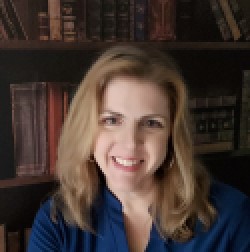 Heather Pendley (PendleysProEditing.com) is a freelance indexer and copy editor. She is an ASI Director at Large, the Membership & Social Media Committee VP for SD/PEN, was an EFA 2020–21 Board of Governors Member at Large, and judged ACES 2020 Headline Competition. Heather lives in the San Diego area with her family, which includes two rescue dogs.
Heather Pendley (PendleysProEditing.com) is a freelance indexer and copy editor. She is an ASI Director at Large, the Membership & Social Media Committee VP for SD/PEN, was an EFA 2020–21 Board of Governors Member at Large, and judged ACES 2020 Headline Competition. Heather lives in the San Diego area with her family, which includes two rescue dogs.

 April: English Language Month. A month-long celebration of the uniqueness of the English language and all the learners working hard to master it.
April: English Language Month. A month-long celebration of the uniqueness of the English language and all the learners working hard to master it.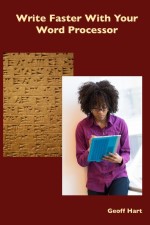 Whether you are a hobbyist or a full-time writer/editor, Hart’s
Whether you are a hobbyist or a full-time writer/editor, Hart’s  Alexandra Goodman
Alexandra Goodman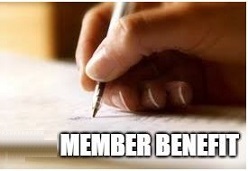 Member Benefit #28
Member Benefit #28
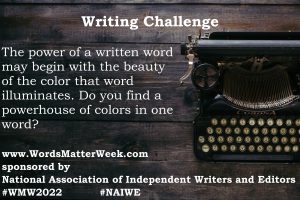 The power of a written word may begin with the beauty of the color that word illuminates. Do you find a powerhouse of colors in one word?
The power of a written word may begin with the beauty of the color that word illuminates. Do you find a powerhouse of colors in one word?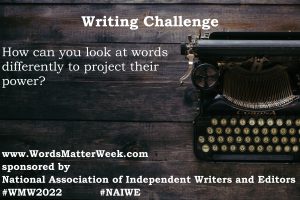 How can you look at words differently to project their power?
How can you look at words differently to project their power?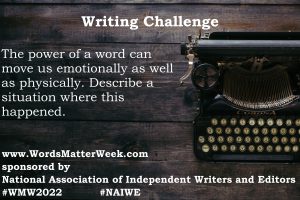 The power of a word can move us emotionally as well as physically. Describe a situation where this happened.
The power of a word can move us emotionally as well as physically. Describe a situation where this happened.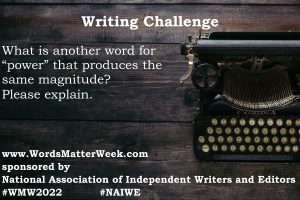 What is another word for “power” that produces the same magnitude? Please explain.
What is another word for “power” that produces the same magnitude? Please explain.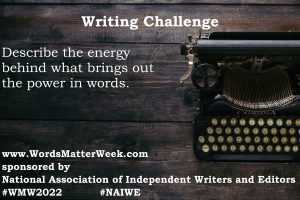 Describe the energy behind what brings out the power in words.
Describe the energy behind what brings out the power in words.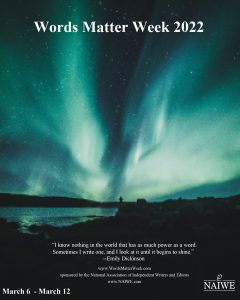 Words Matter Week, which is in its 14th year, is a holiday that is celebrated annually the first full week in March by the National Association of Independent Writers and Editors.
Words Matter Week, which is in its 14th year, is a holiday that is celebrated annually the first full week in March by the National Association of Independent Writers and Editors.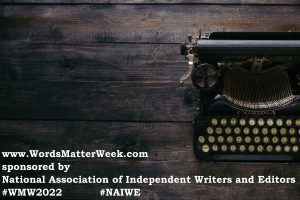 During Words Matter Week, we host a writing challenge. Each day we will post a question on our blog and various social media outlets.
During Words Matter Week, we host a writing challenge. Each day we will post a question on our blog and various social media outlets.